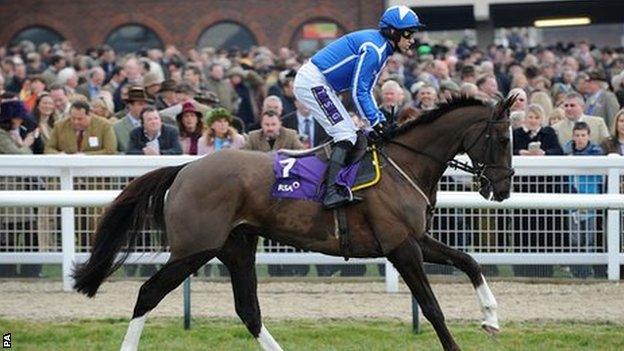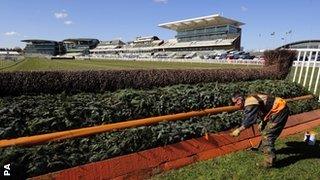Grand National meeting: Little Josh put down after Aintree fall
- Published

Little Josh became the second horse to die at the 2013 Aintree Grand National meeting after falling on Friday.
The 11-year-old, ridden by Sam Twiston-Davies and trained by his father Nigel, fell four fences from home in the Topham Chase, which was run over the redesigned Grand National fences.
He suffered a fractured shoulder and was later put down by veterinary surgeons following treatment.
It followed the death of Battlefront who collapsed on Thursday.
Aintree has altered the Grand National fences for this year's meeting following a number of horse fatalities.
The changes to the fences, which now have a core made of more flexible plastic, rather than wood, and are covered by the traditional spruce, were trialled at the course in December 2012 and were welcomed by World Horse Welfare.
Grand National-winning trainer Twiston-Davies paid tribute to Little Josh, who had finished seventh in last year's race and won the Grand Sefton Chase at the track in December.
He said: "He's gone out doing what he loved the most. He's jumped round those fences before and it's one of those things.
"It could happen anywhere. It could happen at home and it's not the fences - it could have happened at a park course.
"It's desperate, as he is one of Sam's favourite horses and he has been a great servant."
Professor Chris Proudman, veterinary advisor to Aintree, said: "We are sad to confirm that is has been necessary to humanely put down Little Josh on welfare grounds, as a result of his fall at the 15th fence in the John Smith's Topham Chase.

Changes have been made to the fences and the course has been shortened for the 2013 race
"He received immediate veterinary attention for a broken shoulder, but this injury was not treatable and it was the necessary course of action."
John Baker, Aintree and North West Regional Director for Jockey Club Racecourses, said: "I would like to extend our sympathies to the connections of Little Josh following his fall in the John Smith's Topham Chase.
"We have made significant improvements in safety at the course, but we also recognise that jump racing carries risk you can never completely remove from the sport."
The RSPCA's David Muir told BBC Radio 5 live that he was waiting for the full post-mortem results on Little Josh before any potential call for further changes to the Aintree fences.
"I've been to the fence and the horse didn't appear to take off - he just went through the fence to the other side and fell," he said.
"If it had been the old-style fences he wouldn't have gone anywhere, he would have just stopped.
"I checked the fence and it is is forgiving and the fact that the horse didn't try to jump and went through it shows it was forgiving. But in time if we find that the fence is part of the equation we would ask for further changes.
"However, until the post-mortem I can't say what will happen."
Former Grand National-winning jockey Liam Treadwell was taken to hospital after falling from Regal D'Estruval during the race.
Andrew Lynch, who parted company with Mister First, was treated at the course's medical centre.
Nineteen of the 29 runners finished the race, which was run over two miles and five-and-a-half furlongs.
Treadwell does not have a ride in Saturday's big race at the Liverpool track while Lynch is due to ride Treacle.
Last year's Grand National saw the deaths of Synchronised and According to Pete who became the ninth and 10th horses to have died in the race in the past 12 years.
For this year's race, the start will be moved 90 yards closer to the first fence to try to slow the speed at which the horses approach the fence and also to move the horses away from the crowd and reduce the noise.
Jockeys have also been warned to "keep calm" at the start of the race.
Statistics show that, on average, more than half the falls in the 30-fence National occur in the first 90 seconds of a race that lasts more than nine minutes.
Riders have also been urged to remember that they should use the full width of the course to avoid crowding around the inside line.
- Published5 April 2013
- Published4 April 2013
- Published4 April 2013
- Published6 April 2013
- Published3 April 2013
- Published4 April 2013